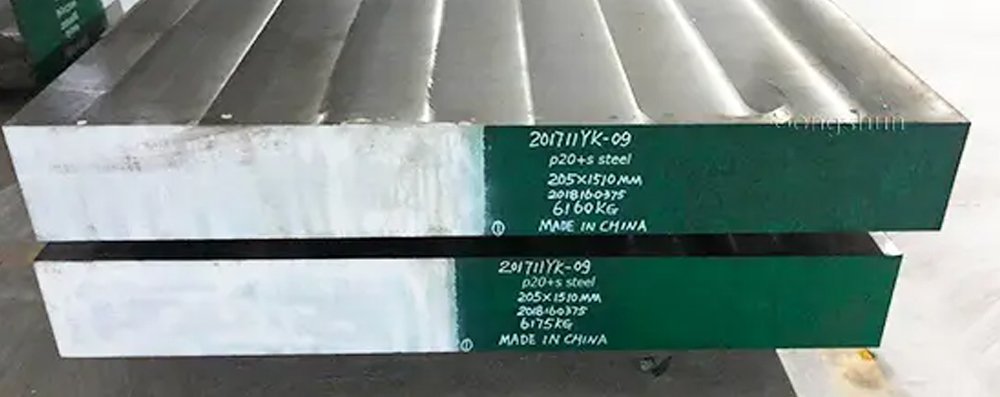Introduction
P20+S (also known as P20S) is a premium plastic mold steel developed from the traditional P20 grade with an intentional addition of sulfur (S) to enhance machinability. This pre-hardened mold steel offers the ideal combination of toughness, machinability, and strength, making it especially suitable for molds that require fast machining and good surface finish.
P20+S is supplied in a hardened and tempered condition, eliminating the need for additional heat treatment before use. It is widely used in the production of plastic injection molds, die casting dies, and other tooling applications requiring a balance of durability, machinability, and polishability.
Properties of P20+S Steel:
- Pre-Hardened Delivery: Supplied with a hardness between 28–34 HRC.
- Improved Machinability: Enhanced cutting performance due to sulfur addition.
- Good Polishability: Suitable for high-finish surface requirements.
- Good Toughness and Strength: Maintains integrity under working stresses.
- Uniform Hardness: Throughout the cross-section.
- Dimensional Stability: Reduces distortion during machining and in service.
Uses/Applications:
P20+S is extensively used across a variety of industries for applications such as:
- Plastic Injection Molds: Especially where fast machining and good surface finish are required.
- Blow Molding Dies: For hollow plastic components.
- Die Casting Dies: Primarily for low-melting point alloys like zinc and aluminum.
- Mold Bases and Frames: Suitable for medium to large-sized molds.
- Automotive Parts: Molds for interior and exterior parts such as bumpers and panels.
- General Engineering Applications: Components requiring moderate wear resistance and high machinability.
Chemical Composition:
| Element | Content (%) |
| Carbon (C) | 0.28 – 0.40 |
| Silicon (Si) | 0.20 – 0.80 |
| Manganese (Mn) | 0.60 – 1.00 |
| Chromium (Cr) | 1.40 – 2.00 |
| Molybdenum (Mo) | 0.30 – 0.55 |
| Sulfur (S) | 0.05 – 0.10 |
| Phosphorus (P) | ≤ 0.035 |
The addition of sulfur improves chip breaking and machining performance without drastically reducing toughness.
Mechanical Properties:
| Property | Typical Value |
| Hardness (as delivered) | 28 – 34 HRC |
| Tensile Strength | ~950 – 1100 MPa |
| Yield Strength | ~750 MPa |
| Elongation at Break | ~12% |
| Impact Toughness | Good |
These mechanical properties make P20+S ideal for tools subjected to medium mechanical loads with high precision requirements.
Physical Properties:
| Property | Typical Value |
| Density | ~7.85 g/cm³ |
| Modulus of Elasticity (E) | 205 GPa |
| Thermal Conductivity | ~29 W/m·K at 20°C |
| Coefficient of Thermal Expansion | 11.8 × 10⁻⁶ /°C |
| Specific Heat Capacity | ~460 J/kg·K |
The excellent thermal conductivity ensures uniform temperature distribution during mold operation.
Heat Treatment:
P20+S is generally used in the supplied pre-hardened condition; however, additional processes can be applied for specific needs:
- Stress Relieving: After rough machining, heat to approximately 550–650°C, hold for 1–2 hours, then cool in air.
- Surface Hardening (Nitriding/Carburizing): Possible to increase surface hardness while maintaining a tough core.
- Re-hardening (if needed): Reheat to 840–870°C, quench in oil or polymer, and temper appropriately.
Heat treatments improve surface durability and life of the mold/tool.
Machinability:
- P20+S offers excellent machinability due to sulfur content.
- Chip formation is improved, reducing tool wear.
- Suitable for high-speed machining operations like drilling, milling, and turning.
- Superior surface finishes are achievable without excessive tool degradation.
P20+S is about 80% as machinable as free-cutting steels.
Dimensional Tolerances:
Precision manufacturing standards apply:
- Bright Round Bars: h9 or h11 tolerance class.
- Forged Bars and Plates: Custom tolerances available on request.
- Machined Blocks: Provided with tight tolerance control for mold making.
Dimensional accuracy reduces the need for further machining.
Forging:
- Forging Temperature Range: 1050°C to 850°C.
- Forging Procedure: Heat uniformly, forge, and then cool slowly in furnace or dry ash.
- Precautions: Avoid rapid cooling to minimize internal stress and potential cracking.
Corrosion Resistance:
- P20+S has moderate corrosion resistance.
- It is not a stainless steel, so protective coatings or surface treatments are recommended for applications exposed to moist environments.
- Regular maintenance and proper storage conditions extend its life.
Weldability:
- P20+S can be welded with proper technique.
- Preheat to 200–300°C before welding.
- Post-weld stress relieving (~550–650°C) is recommended to minimize residual stresses and prevent cracking.
- Welding electrodes should be selected to match the base metal properties.
Correct welding practice is critical to maintain material properties after repair or fabrication.
Available Form:
P20+S is available in a variety of shapes and forms to suit different applications:
- Bright Round Bars
- Flat Bars
- Forged Blocks
- Plates
- Custom Machined Mold Bases
Custom sizes and shapes can be produced as per requirement.
Conclusion:
P20+S (P20S) tool steel is a highly versatile, pre-hardened mold steel with excellent machinability, good toughness, and reliable dimensional stability. It is especially suited for medium to large mold structures where a combination of fast machining and decent strength is crucial.
With the added sulfur improving machinability without severely affecting toughness, P20+S has become a popular choice among mold manufacturers, die casters, and tooling engineers worldwide. Proper maintenance, surface treatment, and correct fabrication techniques ensure that P20+S delivers long-lasting and cost-effective performance across a wide range of industrial applications.
Related Products : D2, DB6, DIN 1.2714, DIN 1.2080, DIN 1.2379, DIN 1.2343, DIN 1.2344, EN31, H11, H13, OHNS, HCHCR, M2, P20+S, P20, P20+Ni, K310, Maps


